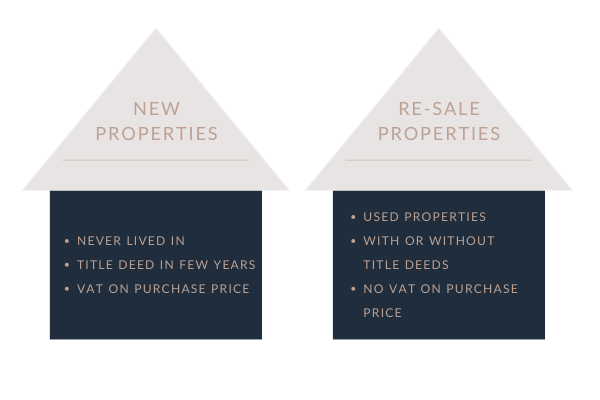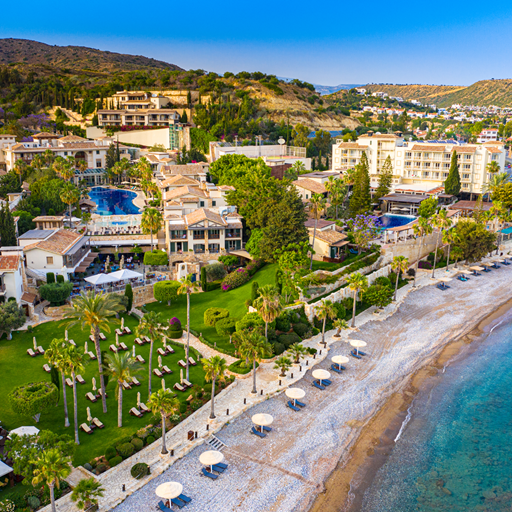The Basic Differences
Primarily let us clarify the terminology. By the term “new property” we mean a property which has never been lived in and this includes a property which is “off-plan” (construction not yet started), as well as a property which may be under construction, whether part of a building project or on its own.
On the other hand, by using the term “re-sale” we refer to a property which has been previously used and such a property could be one with a title deed in place or a property which is still pending the issuance of a title deed.

Buying New Property
The five main issues to be aware of are:
1. When buying a new property, one needs to pay Value Added Tax (VAT) in addition to the purchase price (although this is the rule there may be some rare exceptions which will not be analyzed in the present article). VAT is charged at 19% unless the buyer is eligible for a VAT reduction in which case after receiving the said reduction permission the VAT rate is reduced to 5%.
2. The title deed covering the new property will not be available at the time of signing the contract for the purchase of the property, nor at the time of taking delivery of possession of the property (receipt of the keys). The title deed for the property should usually become available to be transferred and registered in the name of the buyer a couple of years after the construction of the property is completed.
3. Because there is VAT applicable on the purchase price, there should be no Transfer Fees to be paid to the Land Registry for the registration of the title deed of the property in the name of the buyer.
4. One may purchase a new property directly from the Developer or from another person who had purchased the property from the Developer (e.g. while the property was under construction) and it will still be considered a new property; the key is that the property was never used.
5. The due diligence searches over the property should include among others:
(a) land registry searches for mortgages and other charges over the land on which the property is constructed (because the property itself would not yet have its own title deed);
(b) obtaining copies of the construction permissions in place for the property. Some of which may still be in process if the property is “off-plan” or under construction;
(c) the payment of the purchase price should be connected to completion of construction stages (off-plan and under construction properties). There should also be an amount withheld to be paid when the title deed of the property is issued.
Are you looking for advice on choosing property in Cyprus?
Schedule a free consultation with us today
Buying a Re-sale Property
The five main issues to keep in mind are:
1. No VAT is payable on the purchase price of a used property.
2. A re-sale property without a title deed issued, necessitates investigations to be carried out to establish the reasons why the deed is not yet available. It may be that all the property due diligence information is in order, and the issuance of the deed is in the pipeline. On the other hand, the due diligence searches may uncover problems with the property which are hindering the issuance of the title deed for the property.
3. When buying a re-sale property with a title deed, the purchase price is usually broken down in the following payments:
(a) reservation deposit;
(b) 20-30% simultaneously with the signing of the contract of purchase; and
(c) balance on the completion of the transaction.
4. There will be Transfer Fees to be paid to the Land Registry for the registration of the title deed of the property in the name of the buyer. These are calculated by the land registry based on a valuation of the property which they will conduct.
5. For a re-sale property with a title deed, the due diligence searches should include among others:
(a) land registry searches for mortgages and other charges over the deed of the property;
(b) obtaining copies of all the construction permissions for the property (planning permission, building permission and final approval certificate);
(c) instructing a civil engineer to carry out a structural survey over the property. The civil engineer should also check that the property complies with the construction permissions and does not have any illegal extensions or other illegal structures connected to it; and
(d) the final balance of the purchase price should be linked with the transfer of the title deed of the property at the land registry in the name of the buyer (free of charges, mortgages and encumbrances) and the delivery of possession by the handing over of the keys to the buyer.

Conclusion
In conclusion, when considering the choice between buying a new property or a re-sale property in Cyprus, it’s essential to understand the fundamental differences between the two.
New properties often come with the requirement to pay Value Added Tax (VAT), a delay in obtaining the title deed, and a different payment structure. On the other hand, re-sale properties do not involve VAT, but may require a more thorough due diligence process to ensure the property’s legal status.
Ultimately, the decision should align with your financial situation, preferences, and the specific circumstances of each property transaction, emphasizing the importance of careful research and professional guidance in making the right choice for your real estate investment in Cyprus.
ALSO READ:
• UPDATED VAT RULES FOR PROPERTY ACQUISITIONS IN CYPRUS
• 5 MISTAKES PEOPLE MAKE WHO BUY PROPERTY IN CYPRUS
• A BEGINNER’S GUIDE TO BUYING PROPERTY IN CYPRUS